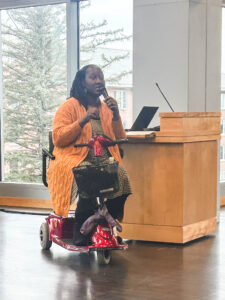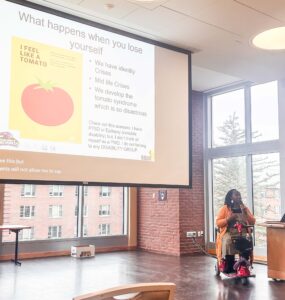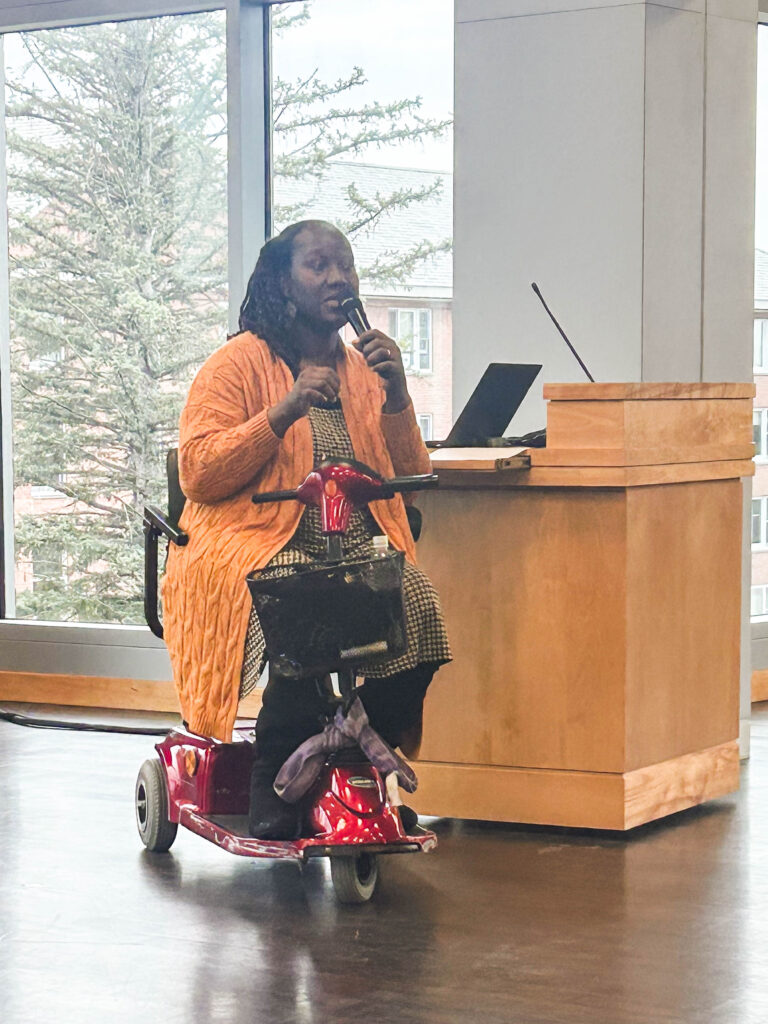
Sefakor G.M.A. Komabu-Pomeyie (photo by Caitlin Herz ’26)
Sefakor G.M.A. Komabu-Pomeyie, Ph.D. recently published her first book I’m Able: A Woman’s Advice for Disability Change Agents. In it, she writes about her upbringing in Ghana and her experience as a Black woman with a physical disability. Sefakor said her book, which she calls “her life story,” unravels different aspects of her identity and brings forth the need for change in our society, for it to be more accessible for those with disability.
Komabu-Pomeyie spoke on April 10, as part of Saint Michael’s DEI Week. Komabu-Pomeyie said how her identity and intersectionality has a lack of representation within today’s media. She said that by educating others, the world will become a more inclusive and accepting place for everyone.
“Stigma revolves around us every day,” Komabu-Pomeyie said and noted that the education systems in place in today’s world neglects many people with disabilities, leaving them to fall through the cracks and not be able to live up to their full potential. The root of the problem, she said, is the stigma around disabled people being deemed “incapable,” even though disability lies on a vast spectrum and can look different on every individual. Society’s stigmatization of disabled people, she said, is the reason why inaccessibility is so present in their daily lives, and these engrained ideas need to be dissected and restored differently.
Komabu-Pomeyie said she has a deep passion for self-confidence and knowing who you are. She believes that society needs

Sefakor G.M.A. Komabu-Pomeyie (photo by Caitlin Herz ’26)
more empowering messages in the media featuring disabled people, and more education on disability to aid individuals to discover more about themselves, and their disability.
Komabu-Pomeyie used the tomato as an analogy. Technically, she said, a tomato is a fruit, but public opinion still classifies it as a vegetable much of the time. This analogy is symbolic, she said, for many people with disabilities. The lack of conversation around disability also creates the problem of humans not knowing how to identify their own disability. Many people have disabilities that are not visible, yet still impact them, she said.
Komabu-Pomeyie presented a graphic that read, “I have a disability, but I don’t think of myself as disabled. Just like a tomato that’s technically a fruit, but feels like a vegetable.”
Komabu-Pomeyie referred to this concept as the “tomato syndrome.” This causes them to lose sense of who they are, Komabu-Pomeyie said. She noted that by accepting one’s disability and intersectional identity, empowerment for disabled people can begin.

For all press inquiries contact Elizabeth Murray, Associate Director of Communications at Saint Michael's College.






